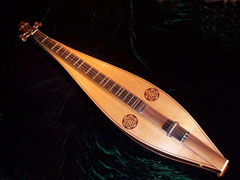Baby Grand
Baritone Teardrop
A Review by David Moore
David Moore, columnist for the "Dulcimer Player News," dulcimer teacher, and director of the "Northeast Dulcimer Symposium" recently posted this review of the Bear Meadow Baby Grand on the dulcimer-list, an internet reading list. The instrument he reviewed was set up as a baritone instrument, tuned to AAEa.
"We've been hearing about the Bear Meadow "Baby Grand" for some time nowand it was a great pleasure to test drive it on the shores of Blue Mountain Lake. Before I get further, let me mention that I have no financial interest in Bear Meadow Dulcimers, etc. Nor did Dwain ask me towrite this review, etc. Nor do I know what it will cost, etc. Etc, etc. As a baritone owner and a critical player I should share my experience of this instrument with you.
"Before I go on, let me describe what I am currently playing as it does form a baseline. My own baritone is a stock Folkcraft baritone design that was custom built by them in 1998 to their specs from woods I carried back from Australia in 1996. The top of mine is of King William Pine, a now very rare, musically superb but very soft aromatic pine, approximately 80 rings to the inch (my top is over 500 years old) and the head, sides, back, and fretboard are of Tasmanian Blackwood, a highly figured Australian Koa relative. If I recall correctly, the 29 1/2 inch finger board (laminated on the fretboard) is of a variety of Australian ironwood. As I am very satisfied with this instrument, I find it easy to critically look at other instruments.
"Now to the Bear Meadow "Baby Grand" baritone dulcimer. In a word, excellent. The craftsmanship was Dwain's usual outstanding work. The instrument I played was of walnut and spruce (from a split billet). The inlay and the carving were gorgeous on the teardrop design. The sound box was deep and this helped develop the rich, full sound of this instrument. The dense hardwood finger board laminated onto the fretboard meant the tapping from hammer-ons did not sound out. The action was excellent. The slightly shorter fret pattern (approx 27 1/2 inches versus 29 or so on the Rockwell and Folkcraft instruments) means this instrument is good for someone with slightly smaller hands. The addition of Dwain's unique patented FlexiFrets(tm) really opened up some nice possibilities, too.
"Bear Meadow dulcimers, and their predecessors, Sunhearth dulcimers have a distinctly easy playability. This instrument was no exception. The action was superb and playing the instrument was a real pleasure. Indeed it almost played itself.
"Let me mention the all important tone. Tuned to A-E-a-a, the "Baby Grand" has an overall tone that is warm, full, and rich. I have been extremely dissatisfied with some of the other short scale baritones I have seen, heard, and played. In general I found their tonal qualities thin and weak, lacking the critical overtones. The "Baby Grand" had all the right overtones, indeed it sounded better than a long scale baritone instrument I once played. There were a couple of places where the sound dropped off slightly but this is inherent in a teardrop design so I was expecting it. I am familiar with this property of teardrop instruments and know how to play around it. I shall be very interested to hear how the sound on this nice instrument matures after a couple of years of playing.
"Bottom Line: Dwain Wilder, the successor to the Walt Martin's Sunhearth dulcimers has designed and built another excellent instrument that brings a top-of-the-line shorter scale baritone dulcimer to the market place. The walnut and spruce combination makes a sound box that has excellent tonal qualities. The Bear Meadow "Baby Grand" looks gorgeous, sounds excellent and is a pleasure to play. This is a dulcimer I would own gladly."
David Moore

